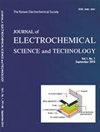掺硼金刚石电极电化学测定化学需氧量
IF 3
4区 工程技术
Q3 ELECTROCHEMISTRY
Journal of electrochemical science and technology
Pub Date : 2023-03-20
DOI:10.33961/jecst.2023.00017
引用次数: 1
摘要
本文章由计算机程序翻译,如有差异,请以英文原文为准。
Electrochemical Determination of Chemical Oxygen Demand Based on Boron-Doped Diamond Electrode
A rapid and environment-friendly electrochemical sensor to determine the chemical oxygen demand (COD) has been developed. The boron-doped diamond (BDD) thin-film electrode is employed as the anode, which fully oxidizes organic pollutants and provides a current response in proportion to the COD values of the sample solution. The BDD-based amperometric COD sensor is optimized in terms of the applied potential and the solution pH. At the optimized conditions, the COD sensor exhibits a linear range of 0 to 80 mg/L and the detection limit of 1.1 mg/L. Using a set of model organic compounds, the electrochemical COD sensor is compared with the conventional dichromate COD method. The result shows an excellent correlation between the two methods.
求助全文
通过发布文献求助,成功后即可免费获取论文全文。
去求助
来源期刊

Journal of electrochemical science and technology
ELECTROCHEMISTRY-
CiteScore
6.30
自引率
8.10%
发文量
44
期刊介绍:
Covering fields:
- Batteries and Energy Storage
- Biological Electrochemistry
- Corrosion Science and Technology
- Electroanalytical Chemistry and Sensor Technology
- Electrocatalysis
- Electrochemical Capacitors & Supercapcitors
- Electrochemical Engineering
- Electrodeposition and Surface Treatment
- Environmental Science and Technology
- Fuel Cells
- Material Electrochemistry
- Molecular Electrochemistry and Organic Electrochemistry
- Physical Electrochemistry
- Solar Energy Conversion and Photoelectrochemistry
 求助内容:
求助内容: 应助结果提醒方式:
应助结果提醒方式:


